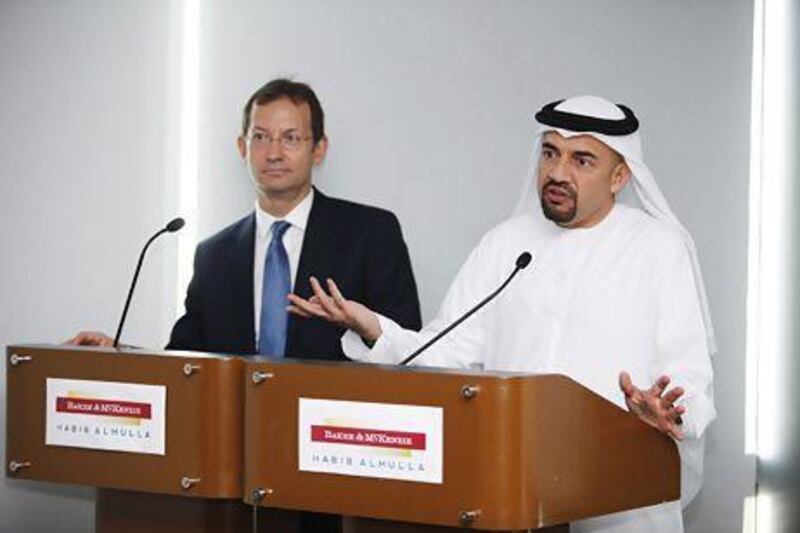Habib Al Mulla, the leading UAE law firm, has set a milestone in the legal profession by merging with the world's largest law firm Baker & McKenzie of the United States.
The tie-up, announced yesterday, is the first time a UAE firm has entered into a full merger agreement with a western legal concern. Mr Al Mulla said the deal to merge his practice was a "new chapter and a momentous occasion" in his firm's 29-year history.
Mr Al Mulla has represented members of the ruling families of Dubai and Abu Dhabi in the UAE and abroad, and been involved in some of the highest profile litigation and arbitration cases in the country's courts. Baker & McKenzie, set up in Chicago in 1949, regularly tops the professional ranking lists for billings and global offices.
The new firm in Dubai - to be called Baker & McKenzie Habib Al Mulla - will be a limited liability partnership with existing Al Mulla partners retaining that status.
Mr Al Mulla will become a full partner of Baker & McKenzie, as well as being the chairman and co-managing partner of the new firm. Neither side would disclose any financial aspects of the transaction.
Borys Dackiw, the managing partner of Baker & McKenzie in the Arabian Gulf, said: "It's a merger of expertise and human assets. We have financial projections and we're optimistic there will be a significant uptick" [from the Al Mulla deal]. Baker & McKenzie's global revenues last year were US$2.3 billion (Dh8.44bn).
"It's a case of one plus one equals five," Mr Al Mulla said.
Mr Dackiw added: "We are passionately global, but we like to plant deep roots in local offices. We want to hire the most talented lawyers in the places we do business." The US firm has had a presence in the Middle East since it opened an associated office in Saudi Arabia in 1979. It opened an office in Abu Dhabi four years ago.
The two firms have worked together before on "joint efforts", Mr Al Mulla said, adding that the merger was aimed at taking advantage of a new climate in Emirati commercial culture.
"The legal landscape in the UAE continues to become more sophisticated, as do client requirements. In line with our strategy for growth, the merger creates a unique law firm offering, with extensive local capabilities, including court representation, together with global scale," he said.
The firm has enjoyed a rise in litigation and arbitration work in the UAE since the financial crisis of 2009, he said, but he believed that increase was now slowing down, and he expected a rise in corporate work.
"Whoever hasn't filed a case arising from the crisis will not be filing one now. The growth in litigation is falling off, but of course litigation will always be there," Mr Al Mulla added.
The new UAE firm would offer expertise in Islamic finance and tax advisory matters to local family offices, and would continue to give advice on legal aspects of US-led sanctions against Iran.
Mark Beer, the registrar of the DIFC Courts, said: "Habib has got a great reputation in the region, and if you overlay that with the global presence of Baker & McKenzie, Dubai has got a powerful new legal force."





